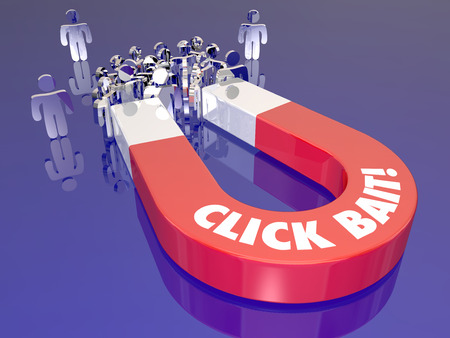Five problems with click-bait advertising

One of the most effective ways to get people to click on an ad is by using a text headline or image that catches the eye, and which generates curiosity in what may lie on the other end of that click. A well-crafted headline can boost the
click-through rate for any ad, which is why advertisers put so much thought into what to put on their ad. There are some who are a little more unscrupulous, using headlines that certainly generate interest and clicks, but have little or anything to do with the content that they lead to. This type of headlines are known as click-bait, and there are several reasons why click-baiting is a bad idea. Let’s look at 5 of those reasons:
Disappoint your audience
If you spend any amount of time online in a given day, you are probably bombarded with ads and headlines, not all of which are overly appealing. Clickbait articles are specifically designed to make people curious enough to click, but imagine how disappointed, or perhaps even angry, those people will be when they see that the click goes to a site that shows no real or interesting content but wastes their time. That leads us nicely into the next problem.
A loss of trust
Let’s imagine for a moment that a friend who knows your tastes recommends you that there is a movie you must go and see. You buy your ticket and settle in for the show, only to discover that said movie is awful and is way below your expectation. Would you listen to that same friend the next time they come to you with a recommendation, or would you doubt them? The latter is most likely to be the case. Similarly, click-bait advertisers gamble with the trust of their audience every time they adopt this tactic.
Ads get ignored
Using a clickbait ad once to get a little boost may be forgiven by your audience, but if it’s something that you do all the time, people are going to start ignoring everything that you deliver. This will even carry over to other ads that do not contain clickbait titles, as people will just assume that they are not going to get what they see from the headlines.
Complaints and potential legal issues
Everyone understands that you want to promote your product or service, but you need to be able to do it in a responsible way that still delivers the truth. If you exaggerate, over-hype or tell outright lies, your customers will complain to the relevant authorities, and some may decide to start legal action to fight your deceptive advertising practices.
Social media issues
It’s fair to say that clickbait headlines are most commonly used in social media when trying to get followers to go to a specific page. As a viewer, be prepared to get blasted in the recommendation or comment section with these types of posts. As a publisher, or content creator, be prepared to have many people unfollow you on social media if you go over the top. Consumers today are a fickle bunch, and they will ditch you quickly if they feel as though you are trying to mislead them.
Related
- Click-bait advertising can damage your business as an advertiser
"If you have spent any time on the internet, you will almost certainly have seen an ad or a clickable headline that grabbed your attention. After clicking on the link, you are taken to a page that has very little to do with the headline you read, or which forces you to flip through countless ad-filled pages to hopefully get to the part of the story that you actually wanted to read. " More
- Problems with click-bait advertising and how to avoid them
"Click-bait advertising is a type of online advertising that uses sensational, misleading, or controversial headlines and images to lure users into clicking on an ad or visiting a website. The goal is to generate a large amount of traffic to a website or other online destinations without considering if the content is actually relevant or valuable to the viewer. " More
- Problems with click-bait advertising and how to avoid them (part 2)
"Using click bait in ads is problematic because of misleading content and ad fatigue. Moreover, it may generate traffic in the short term but often damage the reputation and make it more difficult to reach the target audience. " More
 One of the most effective ways to get people to click on an ad is by using a text headline or image that catches the eye, and which generates curiosity in what may lie on the other end of that click. A well-crafted headline can boost the click-through rate for any ad, which is why advertisers put so much thought into what to put on their ad. There are some who are a little more unscrupulous, using headlines that certainly generate interest and clicks, but have little or anything to do with the content that they lead to. This type of headlines are known as click-bait, and there are several reasons why click-baiting is a bad idea. Let’s look at 5 of those reasons:
One of the most effective ways to get people to click on an ad is by using a text headline or image that catches the eye, and which generates curiosity in what may lie on the other end of that click. A well-crafted headline can boost the click-through rate for any ad, which is why advertisers put so much thought into what to put on their ad. There are some who are a little more unscrupulous, using headlines that certainly generate interest and clicks, but have little or anything to do with the content that they lead to. This type of headlines are known as click-bait, and there are several reasons why click-baiting is a bad idea. Let’s look at 5 of those reasons: